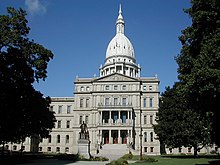Michigan Legislature
This article needs additional citations for verification. (May 2010) |
Michigan Legislature | |
|---|---|
| 99th Michigan Legislature | |
 | |
| Type | |
| Type | |
| Houses | Senate House of Representatives |
| Leadership | |
House Majority Floor Leader | |
| Structure | |
| Seats | 148 voting members: 38 senators 110 representatives |
 | |
Senate political groups | Majority
Minority
|
 | |
House of Representatives political groups | Majority
Minority
|
| Authority | Article IV, Michigan Constitution |
| Elections | |
Last Senate election | November 4, 2014 |
Last House of Representatives election | November 8, 2016 |
Next Senate election | November 6, 2018 |
Next House of Representatives election | November 6, 2018 |
| Meeting place | |
 | |
| Michigan Capitol, Lansing, Michigan | |
| Website | |
| legislature | |
| Footnotes | |
| 1Formal election of the Speaker to take place Jan. 11, 2017. | |
The Michigan Legislature is the legislature of the U.S. state of Michigan. It is organized as a bicameral body consisting of the Senate, the upper house, and the House of Representatives, the lower house. Article IV of the state's Constitution, adopted in 1963, defines the role of the Legislature and how it is to be constituted. The Legislature meets in the Capitol building in Lansing, Michigan.
Titles
Members of the Senate are commonly referred to as senators and members of the House of Representative are commonly referred to as representatives. Because this shadows the terminology used to describe members of Congress, constituents and news media, using The Associated Press Stylebook, often refer to legislators as state senators or state representatives to avoid confusion with their federal counterparts. Michigan Constitution Article IV defines the Legislative Branch and powers, saying in section 1 that "the Legislative power of the State of Michigan is vested in a senate and a house of representatives." Legislators are referred to as senators or representatives depending which chamber they were elected.[1]
Michigan Senate
The Senate is the upper house of the Legislature. Its members are elected on a partisan basis for four-year terms concurrent with the election of the Governor of Michigan.[1] The Senate consists of 38 members elected from single-member election districts[1] ranging from 212,400 to 263,500 residents according to the most recent creation of districts (2002). Senators' terms begin at noon on January 1 following their election. The Senate chamber in the State Capitol is located in the south wing of the building. As of 2015, Republicans hold a majority of seats in the Senate with 27; Democrats hold 11 seats.[2] Under the Michigan Constitution, the Lieutenant Governor of Michigan serves as President of the Senate but may only cast a vote in the instance of a tie.[1] The Senate selects its other officers and adopts its own rules of procedure at the start of a new legislative session.
Michigan House of Representatives
The House of Representatives is the lower house of the Legislature. Its members are elected on a partisan basis for two-year terms at the same time at which Representatives in U.S. Congress are chosen. The House of Representatives consists of 110 members who are elected from single-member election districts[1] ranging from 77,000 to 91,000 according to the most recent creation of districts (2012). Representatives' terms begin at noon on January 1 following their election. The House of Representatives chamber in the State Capitol is located in the north wing of the building. As of 2015, Republicans hold a majority of seats in the House of Representatives with 61, and Democrats hold 46 seats. The House of Representatives selects its own Speaker of the House and other officers and adopts its rules of procedure at the start of a new legislative session.
Terms and sessions
Every two years the entire House of Representatives stands for election, whereas the Senate does so at four-year intervals concurrently with elections for governor.[1] For reckoning periods of time during which the legislature operates, each two-year period coinciding with the election of new members of the House of Representatives is numbered consecutively as a legislature, dating to the first legislature following Michigan's admission as a state.[inconsistent] The current two-year term of the legislature (January 1, 2017 –December 31, 2018) is the 99th Legislature.
Each year during which the Legislature meets constitutes a new session. According to Article IV Section 13 of the state constitution, a new session of the Legislature begins when the members of each house convene on the second Wednesday of January every year at noon. A regular session of the Legislature typically lasts throughout the entire year with several periods of recess and adjourns sine die in late December.
The Michigan Legislature is one of ten full-time state legislative bodies in the United States.[3] Members of the Michigan Legislature receive a base salary of $71,685 per year, which makes them the fourth-highest paid legislators in the country, after California, Pennsylvania and New York. While legislators in many states receive per diems that make up for lower salaries, Michigan legislators receive $10,800 per year for session and interim expenses.[4] Salaries and expense allowances are determined by the State Officers Compensation Commission.[1]
Any legislation pending in either house at the end of a session that is not the end of a legislative term of office continues and carries over to the next legislative session.
Term limits
The electors of the State of Michigan adopted an amendment to the Constitution in 1992, Section 54 of Article IV, which became effective in 1993. This amendment limits the length of time any individual may serve as a member of the Legislature.[1]
Pursuant to this amendment, one may not be elected to the Senate more than two times or to the House of Representatives more than three times.[1] The result of this is that there is now considerable turnover in membership in both houses of the Legislature.
Formerly, many seats were held by the same office holder, sometimes for decades. Although measures to repeal the term limits amendment have been introduced in both houses since it took effect, none of them have yet reached a vote on the floor of either house or received serious deliberation in the Legislature.
Joint committees
The Michigan Legislature has a number of standing joint committees, that contain members from both houses:
- Legislative Council—oversees various joint offices like the Legislative Service Bureau
- Legislative Retirement Board of Trustees
- Michigan Capitol Committee—oversees the State Capitol Building and its grounds[1]
Also special purpose and conference committees are also formed per issue with conference committees to resolve differences in the houses' separate bills.[1]
See also
References
- ^ a b c d e f g h i j k "Chapter 2: About State Government" (PDF). Michigan in Brief: 1998–99. Public Sector Consultants. 1999.
- ^ "2014 Live Michigan election results: State Senate races". MLive.com. November 4, 2014. Retrieved December 31, 2014.
- ^ http://www.ncsl.org/research/about-state-legislatures/full-and-part-time-legislatures.aspx
- ^ National Conference of State Legislatures
